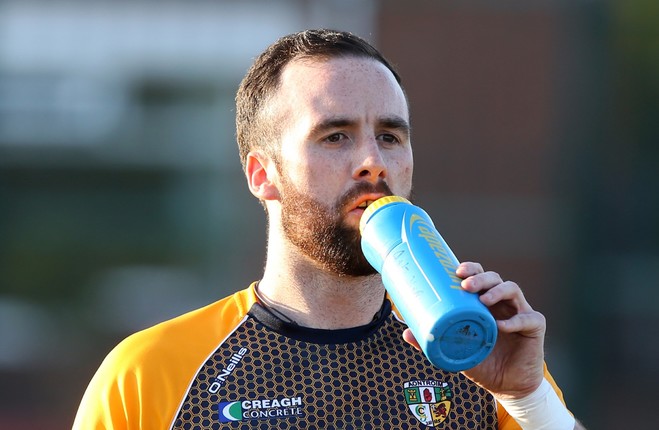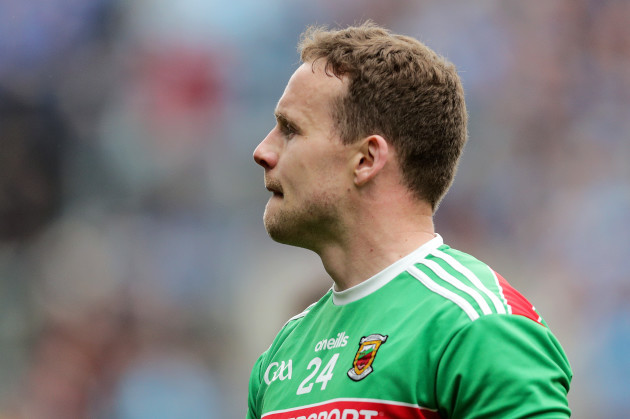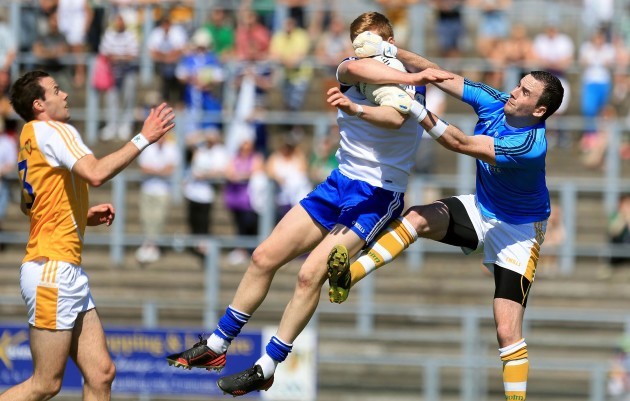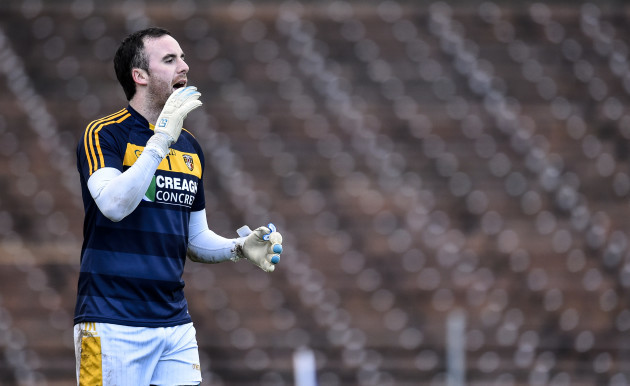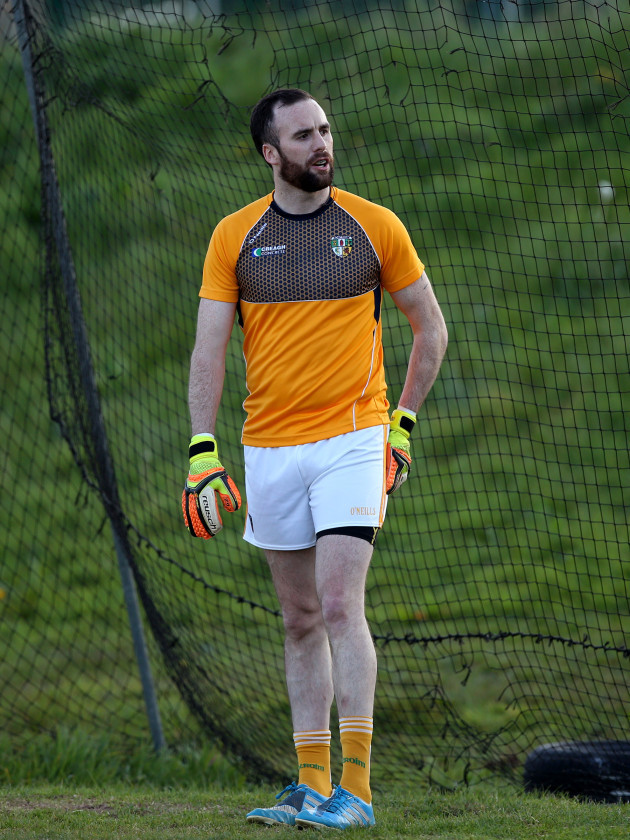IN RECENT TIMES, a number of high profile current and former inter-county players have spoken publicly about their mental health battles.
Former Hurler of the Year Eoin Larkin opened up about his bouts of depression and suicidal thoughts in his newly released autobiography.
Last week in the Irish News, Tyrone’s All-Star defender Ronan McNamee pulled up the blinds on the darkness that once engulfed his life. It led him down a destructive path, which involved self-harm, until the help of family, friends and counselling assisted him in finding the light.
Recently retired Mayo forward Andy Moran told Second Captains in August about the immense grief brought about by his father’s death. He bottled up his emotions for almost a year until he found himself in floods of tears outside a funeral home after a local man’s passing.
It was then that Moran reached out to a friend who was trained in the area of psychology and sought some help.
“It really reset me,” Moran told Richie Sadlier. “I suppose I wasn’t letting myself grieve – I had a good honest, Irish relationship with my dad, but we weren’t the closest.
“You know, you’d never be talking about emotions in front of him or anything like that. That’s the way we were, we were good, we got on but we weren’t the closest in the world. My dad was sick long before he died. He had Alzheimer’s and Parkinson’s and a few other issues going on.
“I probably thought I’d grieved him before that but I just hadn’t really. Then when I asked for the bit of help I was just like, ‘Where was I for the last 10 months?’ And when I got it, I was fine. Once I started talking about it, I let myself cry and let the emotions out I was fine.
“I probably bottled it for nearly a year, but once I got it solved I was fine. You don’t know when it’s fine, but life started getting back on track. My thinking was way clearer. I couldn’t put a date, figure, time on it but I just remember thinking to myself that my shoulders had opened back up and I got back to myself.”
Like Moran, ex-Antrim goalkeeper Chris Kerr greatly struggled after his dad Pat died of cancer in 2013. After the funeral, Kerr threw himself back into work and county football for 18 months, but depression and anxiety eventually descended over him like a fog.
He became withdrawn from his family and football. Once his escape, heading to Antrim training became a chore. Suicidal thoughts flooded his mind. “I had enough of living like this and feeling like this,” he wrote in a powerful blog for the GPA’s Players Voice website.
The sleeping tablets he was prescribed had little effect. He couldn’t sleep at night – “lying in a pool of my own tears” – while feeling exhausted and numb during the day.
Kerr sought out counselling through the GPA, while conversations with some of his closest team-mates helped too. When the depression and anxiety returned a couple of years later, he decided to kick it for good.
He returned for further counselling, learned the tools to deal with his emotions and, in time, the clouds cleared.
The thing about inter-county players is they’re expected to perform in public, no matter what’s going on in their private lives. When tragedy strikes, it can be a difficult environment to openly grieve.
When sportsmen encounter difficult times on the field, like suffering an injury or being dropped, the impulse is to show resilience and battle on.
But that dogged determination to carry on for extended periods of psychological turmoil, as in the cases of the grieving Moran and Kerr, can be detrimental to a players’ mental health.
Even if they put on a brave face, the walls will eventually come crashing in.
“The biggest thing that was said to me was that I’d be really outgoing, loud and in the middle of the craic as a goalkeeper in the changing room and always messing or whatever,” Kerr tells The42.
“The most common feedback I got was, ‘You were the last person you’d ever think something was wrong with.’”
“Playing in them matches – and obviously Andy Moran was playing at a much higher level with Mayo than I was with Antrim – but you just think, ‘There’s Andy Moran he’s doing fine’ but he’s human at the end of the day too.”
Now he is happy to share his story to help others.
The week before we speak, Kerr gave talks at O’Donovan Rossa GAA club and his former school De La Salle College in west Belfast as part of Mental Health Week.
Delighted that past pupil @Kerrso86 took the time to speak about his experiences to our post-16 students as part of Mental Health Week. pic.twitter.com/bBi3VZ3auB
— De La Salle College (@lasallebelfast) October 7, 2019
“It’s worthwhile when you get feedback, maybe not straight away but in the days later if one of the teachers come to you and says, ‘Listen, a couple of the students have gone to school counsellers’ or things like that.
“It makes it worthwhile then. Recently I’ve been doing a little bit more because I got an operation on my cruciate ligament (in September).
“So I had a bit more time away from the pitch to dedicate to it because I’ve been building about 18 months from last February or March when I put out that blog that I did. So I’ve probably been doing it a bit more recently just having that injury.
“I suppose at the time when I was doing it I was thinking it’s hard to know because it’s really unknown. And then the reasoning was just really so people could read it and go, ‘You know what, he’s gone and got help’.
“And it doesn’t have to be grief, as I said earlier it could be gambling or financial or relationship breakdowns or whatever and they go and get help that was my aim.
“But the amount of people and even still now 18 months later there’s still people contacting me saying, ‘I came across the blog and it gave me a kick up the backside. Have you any advice for me what to do?’ It’s nice that way that people are still getting something from it.”
What’s the main message he gives in those talks?
“It’s a catchy wee hashtag but, ‘It’s okay not to be okay.’ It’s especially okay to go and ask for help. It’s not a sign of weakness, regardless of how small it might come across to people.
“Somebody could be in a really bad way over losing 50 quid in the bookies or over splitting up with a girlfriend or whatever it may be. In terms of schools and GAA clubs, create environments where it’s normal to speak about it.
“At the end of the day, you’re not a leper running about with a bell on you when you’ve got a mental health problem. You should be able to speak about it as openly as I would be talking about my cruciate ligament or any sort of physical injury.
“I think that’s the main message. Especially with men and young lads in school playing up in front of an audience or acting like a Jack the Lad in front of people. It’s hard putting on the pretence. You don’t know what’s going on with them behind closed doors when they go home. Somebody going to training, that might be their escape for the hour.
“You don’t know what’s going on at home or in their personal life. Even when people are being coached, you’d see the over-the-top coach shouting and squealing at people. They could be pushing that person towards the edge, even more, when they could be just going to training going, ‘Do you know what? This is my escape from whatever’s doing my head in.’ So it’s a tricky one.”
Kerr reveals that even some inter-county players have reached out to him for advice.
“Oh aye, it’s been nationwide,” he says.
“It hasn’t even just been in Ulster. As I said, it wasn’t necessarily grief that they lost their dad or mum, it was just like, ‘When you went and got in touch with the GPA and got help, I appreciate that as it was a bit of a kick up the backside to go and do it as opposed to just letting it fester.’
“It’s not like we’re robots too. I know you give it your all but at the end of the day there’s a human side to people too. It’s like going into work, you put on what you have to do in work but you’re different outside of work in friends circles or whatever too.
“It just shows that regardless of the level people are at, even Philly McMahon was speaking about it too recently. He’s done a lot of great stuff in memory of his brother and stuff. It just shows it can come on anyone.”
Last year, Kerr was the GPA’s representative in Brussels to address the European Brain Council along with other sporting stars to mark World Mental Health Day.
“They asked me and it was around six months (beforehand),” he recalls. “I suppose when I was going, having been asked, I didn’t really know what I was getting myself into. When I went, I went with one of the guys from the GPA.
“You go and see the size of the European Parliament and all the delegates from all the sporting bodies around Europe – the FA, the equivalent in Germany, Holland and there’s myself. I think my story sort of resonated with a lot of people too regardless of what country you’re from.
“Whatever it may be they seemed to take an interest in it because at some stage everybody is going to lose their parents so you can relate to that. Some people were speaking about injuries and whatnot, but I suppose mine was a bit personal to everyone.
“So it was good, it was a really great experience too,” he adds.
Next week he’ll be in Queen’s University Belfast for a free event where he’ll share his story.
Having come through his own battle, where does that urge to help others come from?
For Kerr, it’s a very personal reason.
“In a weird way in my mind it’s nearly like I’m keeping my dad’s memory alive, you’re not just forgetting about him,” he says.
“When you have kids messaging you then I suppose that’s the plus of social media. If you go into a school they don’t have your mobile number but they can send you a private message on Facebook, Twitter or Instagram.
“I always say, ‘Listen, I’m not an expert but I might be able to point you in the right direction or give you a number that could be able to help you out.’
“I think when you go in and somebody comes back to you and says, ‘That really helped and it got me on the straight and narrow’ so to speak, then that’s a reason to do it. To help others.”
And while there’s plenty of good work being done across the island, Kerr is frustrated at the systems in place in relation to mental health. Some worrying figures around suicide in Northern Ireland have emerged over the past few years.
A 2018 study found that more people died had by suicide in Northern Ireland since the Good Friday agreement in 1998 than were killed in political violence during the Troubles.
It was also reported that Northern Ireland has a 25% higher rate of mental illness than England, with one in five of its adults suffering from a mental health condition at any one time.
Men between the ages of 30-34 in north Belfast are at a higher risk of suicide than anywhere else in the UK. An Ulster University study noted that half of those who died made previous attempts or recorded as having suicidal thoughts, and 40% had been previously prescribed antidepressants.
In the first 18 months after the collapse of the Northern Ireland Assembly, one regional co-ordinator said 463 people had died by suicide in the north.
“Even in Belfast, the spike in suicide rates is crazy,” says Kerr.
“It’s really gone through the roof. I’m from west Belfast and it’s (bad) in the north in general but in west Belfast where I live, it’s just been crazy. It’s every other day you hear of one or there’s just an influx or spate of them in a short period of time.
“You hear it going from 12-year-olds right up to I’ve even heard of men in their 70s (dying by suicide) recently. So it’s a hard one, you don’t know if it’s the increase in using smartphones or the likes of Brexit or people with financial problems. Or betting, because gambling is a big issue for a lot of people too.
“Alcohol, drugs misuse but also how easy it is for people to get drugs too. You don’t know the sort of issues people get into. Obviously, mine was grief after my dad passed away but people’s reasons vary.
“It’s hard to put your finger on it but it just seems to be men and young enough men too. Recently there was a Fresher’s student in the Holylands area of Belfast, gone into first year in Jordanstown. A 19-year-old in first year in Uni, should have been loving life and then for whatever reason died by suicide. It’s worrying.”
Some campaigners believe the rate of suicide in Northern Ireland is related to the trauma suffered by people during the Troubles.
And yet despite the crisis, funding for mental health services in the north was dramatically cut by 25% a couple of years ago. A significant increase in funding was promised some time ago but has yet to arrive.
“It’s due to Stormont not sitting,” explains Kerr. “It hasn’t sat now for two years so the likes of civil servants are tasked with making the big decisions in terms of funding and all.
“There are charities who self-fund and do really good stuff but obviously they need that guidance from the people that set the legislation. There’s a campaign there they call the PPR project and they’re trying to get going.
“It’s called 123GP where they’re trying to have counsellers in each doctor’s surgery now.
“They’re trying to get that up and running to have counsellers because when you go to a GP you’re only getting something on average like 10 to 12 minutes with a GP. And that’s not really long enough if someone’s in a bad state.”
The42 is on Instagram! Tap the button below on your phone to follow us!
